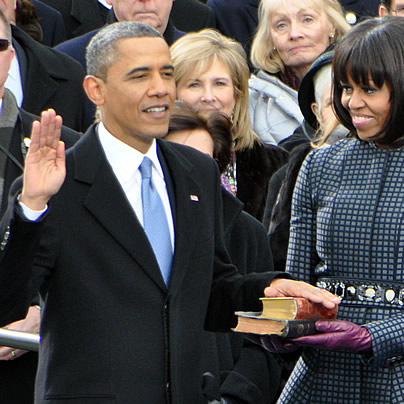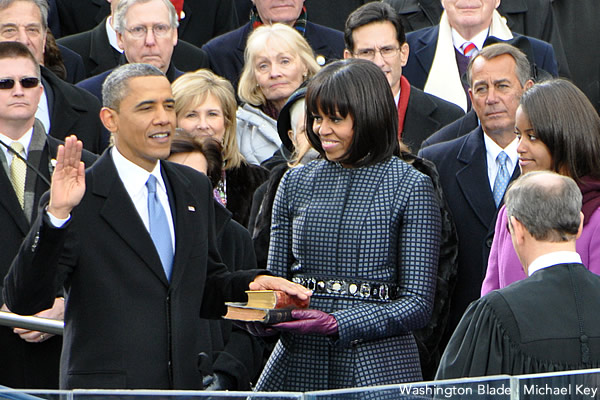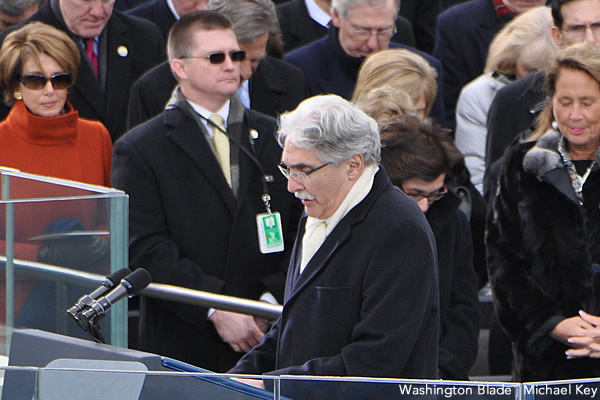National
Obama makes history at start of second term
In first, president includes gay references in address


President Obama made history by including gays and lesbians in his 2013 inaugural address in two references. (Washington Blade photo by Michael Key)
Marking the official start of his second term, President Obama on Monday included for the first-time ever explicit references to the LGBT community in a presidential inaugural speech — a powerful statement because of the symbolic nature of the widely watched speech as a reflection of the American spirit.
Following his swearing-in by Chief Justice of the U.S. Supreme Court John Roberts, Obama delivered the speech, which included many nods to his progressive base, including mentions of climate change, immigration reform in addition to a reaffirmation of the president’s earlier stated support for marriage equality.
“Our journey is not complete until our gay brothers and sisters are treated like anyone else under the law – for if we are truly created equal, then surely the love we commit to one another must be equal as well,” Obama said.
Obama made another reference to the LGBT community when he included a mention of the 1969 Stonewall riots in New York City, which are seen as the start of the modern LGBT rights movement.
“We, the people, declare today that the most evident of truths – that all of us are created equal – is the star that guides us still; just as it guided our forebears through Seneca Falls, and Selma, and Stonewall; just as it guided all those men and women, sung and unsung, who left footprints along this great Mall, to hear a preacher say that we cannot walk alone; to hear a King proclaim that our individual freedom is inextricably bound to the freedom of every soul on Earth,” Obama said.

(Washington Blade photo by Michael Key)
An estimated crowd of at least 500,000 filled the National Mall to hear Obama’s speech. Spectators were bundled in coats and hats as they braved the cold winter temperatures. Still, the weather was more forgiving than during Obama’s 2009 inauguration in which bitter cold chilled those in attendance to the bone.
One LGBT advocate in attendance was Brenda “Sue” Fulton, a lesbian who serves on the board of the LGBT military group OutServe-SLDN. The newly married graduate of the U.S. Military Academy at West Point said she was quite moved by Obama’s LGBT inclusion in the speech.
“When he went on to talk about marriage equality for ‘our gay brothers and sisters,’ four lovely young men in front of us cheered at the top of their lungs,” Fulton said. “I admit that I teared up. We’ve come so far this past four years; I can see all those young people in military uniforms on the platform and all around, and know that not only are some of them gay, but the others know it, and support them.”
Mentions of the LGBT community were part of a larger message in which Obama chose to set the tone for his second term by recalling past challenges the nation has overcome and issuing a call to come together to face the challenges of the present day.
“But we have always understood that when times change, so must we; that fidelity to our founding principles requires new responses to new challenges; that preserving our individual freedoms ultimately requires collective action,” Obama said. “Now, more than ever, we must do these things together, as one nation, and one people.”
No previous president has mentioned LGBT people during an inaugural address. In 2009, Obama didn’t mention the LGBT community despite promising a commitment to LGBT rights over the course of his first presidential campaign. Instead, Obama at the time made a reference to civil rights in general, saying the nation has “tasted the bitter swill of civil war and segregation” and “as the world grows smaller, our common humanity shall reveal itself.”
John Aravosis, editor of AMERICAblog, said he was “impressed” with the way Obama reaffirmed support for the LGBT community and said it could have an impact on the gay-related cases to come before the U.S. Supreme Court.
“In addition to mentioning marriage equality, an African-American president put Stonewall alongside Selma in one of the most important speeches of his presidency,” Aravosis said. “I think that’s hugely significant culturally and politically, and possibly legally as well – the Supreme Court was sitting right there, and they look to the culture and politics when considering decisions on major social issues, like the upcoming marriage cases. This didn’t hurt.”
But LGBT-inclusiveness at the celebration wasn’t just limited to mentions in the widely anticipated speech. Those who attended on the inaugural platform as Obama was sworn into office and delivered his speech included high-profile members of the LGBT community such as Human Rights Campaign President Chad Griffin and Rev. Gene Robinson, the first openly gay bishop consecrated in the Episcopal Church.
“Today, the POTUS moved beyond merely mentioning the existence of our community, to express his commitment to our full citizenship and respect for our love,” Robinson said. “There is no way to overstate the importance of his words and witness to our lives and our love. No, we haven’t ‘arrived,’ but we sure have come a long way down this road! Amazing!”
Other speakers at the event made were gay-affirming in one way or another. The pastor who delivered the closing benediction for the service, Rev. Luis Leon, an Episcopal priest with the D.C.-based St. John’s Church, called for a blessing on all people — including whether they be “gay or straight” — in his closing remarks.

Rev. Luis Leon (Washington Blade photo by Michael Key)
“With the blessing of your blessing we will see that we are created in your image, whether brown, black or white, male or female, first generation or immigrant American, or daughter of the American Revolution, gay or straight, rich or poor,” said León.
Leon, who also delivered the benediction at former President George W. Bush’s inaugural in 2005, was a replacement for Pastor Louie Giglio of the Georgia-based Passion City Church, who withdrew from the role after the blog ThinkProgress revealed that he delivered a virulently anti-gay sermon in the 1990s. In contrast, Leon was one of the religious figures who helped in the 2009 push to legalize same-sex marriage in D.C.
Gay inclusion during the festivities also came in the form of the openly gay inaugural poet — the nationally acclaimed Richard Blanco — who recited a poem titled, “One Today,” which highlights unity despite differences among individuals in America.
“All of us as vital as the one light we move through, the same light on blackboards with lessons for the day: equations to solve, history to question, or atoms imagined, the ‘I have a dream’ we keep dreaming, or the impossible vocabulary of sorrow that won’t explain the empty desks of twenty children marked absent today, and forever,” Blanco read.
In a statement, HRC’s Griffin commended Obama for the LGBT-inclusion in his speech and emphasized the importance of sending such a message in an inaugural address. HRC didn’t immediately respond to a follow-up request for comment on whether the organization helped Obama with the LGBT portions of the speech.
“By lifting up the lives of LGBT families for the very first time in an inaugural address, President Obama sent a clear message to LGBT young people from the Gulf Coast to the Rocky Mountains that this country’s leaders will fight for them until equality is the law of the land,” Griffin said. “As the merits of marriage equality come up for debate from state houses to the halls of the U.S. Supreme Court, and a broad majority of Americans are standing up for liberty and fairness, the President’s unequivocal support for equality is a clarion call that all Americans should receive with celebration.”
Federal Government
Treasury Department has a gay secretary but LGBTQ staff are under siege
Agency reverses course on LGBTQ inclusion under out Secretary Scott Bessent

A former Treasury Department employee who led the agency’s LGBTQ employee resource group says the removal of sexual orientation and gender identity (SOGI) from its discrimination complaint forms was merely a formalization of existing policy shifts that had already taken hold following the second inauguration of President Donald Trump and his appointment of Scott Bessent — who is gay — to lead the agency.
Christen Boas Hayes, who served on the policy team at Treasury’s Financial Crimes Enforcement Network (FinCEN) from 2020 until March of this year, told the Washington Blade during a phone interview last week that the agency had already stopped processing internal Equal Employment Opportunity (EEO) complaints on the basis of anti-LGBTQ discrimination.
“So the way that the forms are changing is a procedural recognition of something that’s already happening,” said Hayes. “Internally, from speaking to two EEO staff members, the changes are already taking place from an EEO perspective on what kind of cases will be found to have the basis for a complaint.”
The move, they said, comes amid the deterioration of support structures for LGBTQ workers at the agency since the administration’s early rollout of anti-LGBTQ executive orders, which led to “a trickle down effect of how each agency implements those and on what timeline,” decisions “typically made by the assistant secretary of management’s office and then implemented by the appropriate offices.”
At the end of June, a group of U.S. House Democrats including several out LGBTQ members raised alarms after a Federal Register notice disclosed Treasury’s plans to revise its complaint procedures. Through the agency’s Office of Civil Rights and EEO, the agency would eliminate SOGI as protected categories on the forms used by employees to initiate claims of workplace discrimination.
But Hayes’s account reveals that the paperwork change followed months of internal practice, pursuant to a wave of layoffs targeting DEI personnel and a chilling effect on LGBTQ organizing, including through ERGs.
Hayes joined Treasury’s FinCEN in 2020 as the agency transitioned into the Biden-Harris administration, working primarily on cryptocurrency regulation and emerging technologies until they accepted a “deferred resignation” offer, which was extended to civil servants this year amid drastic staffing cuts.
“It was two things,” Hayes said. “One was the fact that the policy work that I was very excited about doing was going to change in nature significantly. The second part was that the environment for LGBTQ staff members was increasingly negative after the release of the executive orders,” especially for trans and nonbinary or gender diverse employees.
“At the same time,” Hayes added, “having been on the job for four years, I also knew this year was the year that I would leave Treasury. I was a good candidate for [deferred resignation], because I was already planning on leaving, but the pressures that emerged following the change in administration really pushed me to accelerate that timeline.”
Some ERGs die by formal edict, others by a thousand cuts
Hayes became involved with the Treasury LGBTQ ERG shortly after joining the agency in 2020, when they reached out to the group’s then-president — “who also recently took the deferred resignation.”
“She said that because of the pressure that ERGs had faced under the first Trump administration, the group was rebuilding, and I became the president of the group pretty quickly,” Hayes said. “Those pressures have increased in the second Trump administration.”
One of the previous ERG board members had left the agency after encountering what Hayes described as “explicitly transphobic” treatment from supervisors during his gender transition. “His supervisors denied him a promotion,” and, “importantly, he did not have faith in the EEO complaint process” to see the issues with discrimination resolved, Hayes said. “And so he decided to just leave, which was, of course, such a loss for Treasury and our Employee Resource Group and all of our employees at Treasury.”
The umbrella LGBTQ ERG that Hayes led included hundreds of members across the agency, they said, and was complemented by smaller ERGs at sub-agencies like the IRS and FinCEN — several of which, Hayes said, were explicitly told to cease operations under the new administration.
Hayes did not receive any formal directive to shutter Treasury’s ERG, but described an “implicit” messaging campaign meant to shut down the group’s activities without issuing anything in writing.
“The suggestion was to stop emailing about anything related to the employee resource group, to have meetings outside of work hours, to meet off of Treasury’s campus, and things like that,” they said. “So obviously that contributes to essentially not existing functionally. Because whereas we could have previously emailed our members comfortably to announce a happy hour or a training or something like that, now they have to text each other personally to gather, which essentially makes it a defunct group.”
Internal directories scrubbed, gender-neutral restrooms removed
Hayes said the dismantling of DEI staff began almost immediately after the executive orders. Employees whose position descriptions included the terms “diversity, equity, and inclusion” were “on the chopping block,” they said. “That may differ from more statutorily mandated positions in the OMWI office or the EEO office.”
With those staff gone, so went the infrastructure that enabled ERG programming and community-building. “The people that made our employee resource group events possible were DEI staff that were fired. And so, it created an immediate chilling effect on our employee resource group, and it also, of course, put fear into a lot of our members’ hearts over whether or not we would be able to continue gathering as a community or supporting employees in a more practical way going forward. And it was just, really — it was really sad.”
Hayes described efforts to erase the ERGs from internal communication channels and databases. “They also took our information off internal websites so nobody could find us as lawyers went through the agency’s internal systems to scrub DEI language and programs,” they said.
Within a week, Hayes said, the administration had removed gender-neutral restrooms from Main Treasury, removed third-gender markers from internal databases and forms, and made it more difficult for employees with nonbinary IDs to access government buildings.
“[They] made it challenging for people with X gender markers on identification documents to access Treasury or the White House by not recognizing their gender marker on the TWAVES and WAVES forms.”
LGBTQ staff lack support and work amid a climate of isolation
The changes have left many LGBTQ staff feeling vulnerable — not only because of diminished workplace inclusion, but due to concerns about job security amid the administration’s reductions in force (RIFs).
“Plenty of people are feeling very stressed, not only about retaining their jobs because of the layoffs and pending questions around RIFs, but then also wondering if they will be included in RIF lists because they’re being penalized somehow for being out at work,” Hayes said. “People wonder if their name will be given, not because they’re in a tranche of billets being laid off, but because of their gender identity or sexual orientation.”
In the absence of functional ERGs, Hayes said, LGBTQ employees have been cut off from even informal networks of support.
“Employees [are] feeling like it’s harder to find members of their own community because there’s no email anymore to ask when the next event is or to ask about navigating healthcare or other questions,” they said. “If there is no ERG to go to to ask for support for their specific issue, that contributes to isolation, which contributes to a worse work environment.”
Hayes said they had not interacted directly with Secretary Bessent, but they and others observed a shift from the previous administration. “It is stark to see that our first ‘out’ secretary did not host a Pride event this year,” they said. “For the last three years we’ve flown the rainbow Pride flag above Treasury during Pride. And it was such a celebration among staff and Secretary Yellen and the executive secretary’s office were super supportive.”
“Employees notice changes like that,” they added. “Things like the fact that the Secretary’s official bio says ‘spouse’ instead of ‘husband.’ It makes employees wonder if they too should be fearful of being their full selves at work.”
The Blade contacted the Treasury Department with a request for comment outlining Hayes’s allegations, including the removal of inclusive infrastructure, the discouragement of ERG activity, the pre-formalization of EEO policy changes, and the targeting of DEI personnel. As of publication, the agency has not responded.
U.S. Supreme Court
Supreme Court to consider bans on trans athletes in school sports
27 states have passed laws limiting participation in athletics programs

The U.S. Supreme Court on Thursday agreed to hear two cases involving transgender youth challenging bans prohibiting them from participating in school sports.
In Little v. Hecox, plaintiffs represented by the ACLU, Legal Voice, and the law firm Cooley are challenging Idaho’s 2020 ban, which requires sex testing to adjudicate questions of an athlete’s eligibility.
The 9th U.S. Circuit Court of Appeals described the process in a 2023 decision halting the policy’s enforcement pending an outcome in the litigation. The “sex dispute verification process, whereby any individual can ‘dispute’ the sex of any female student athlete in the state of Idaho,” the court wrote, would “require her to undergo intrusive medical procedures to verify her sex, including gynecological exams.”
In West Virginia v. B.P.J., Lambda Legal, the ACLU, the ACLU of West Virginia, and Cooley are representing a trans middle school student challenging the Mountain State’s 2021 ban on trans athletes.
The plaintiff was participating in cross country when the law was passed, taking puberty blockers that would have significantly reduced the chances that she could have a physiological advantage over cisgender peers.
“Like any other educational program, school athletic programs should be accessible for everyone regardless of their sex or transgender status,” said Joshua Block, senior counsel for the ACLU’s LGBTQ and HIV Project. “Trans kids play sports for the same reasons their peers do — to learn perseverance, dedication, teamwork, and to simply have fun with their friends,” Block said.
He added, “Categorically excluding kids from school sports just because they are transgender will only make our schools less safe and more hurtful places for all youth. We believe the lower courts were right to block these discriminatory laws, and we will continue to defend the freedom of all kids to play.”
“Our client just wants to play sports with her friends and peers,” said Lambda Legal Senior Counsel Tara Borelli. “Everyone understands the value of participating in team athletics, for fitness, leadership, socialization, and myriad other benefits.”
Borelli continued, “The U.S. Court of Appeals for the Fourth Circuit last April issued a thoughtful and thorough ruling allowing B.P.J. to continue participating in track events. That well-reasoned decision should stand the test of time, and we stand ready to defend it.”
Shortly after taking control of both legislative chambers, Republican members of Congress tried — unsuccessfully — to pass a national ban like those now enforced in 27 states since 2020.
Federal Government
UPenn erases Lia Thomas’s records as part of settlement with White House
University agreed to ban trans women from women’s sports teams

In a settlement with the Trump-Vance administration announced on Tuesday, the University of Pennsylvania will ban transgender athletes from competing and erase swimming records set by transgender former student Lia Thomas.
The U.S. Department of Education’s Office for Civil Rights found the university in violation of Title IX, the federal rights law barring sex based discrimination in educational institutions, by “permitting males to compete in women’s intercollegiate athletics and to occupy women-only intimate facilities.”
The statement issued by University of Pennsylvania President J. Larry Jameson highlighted how the law’s interpretation was changed substantially under President Donald Trump’s second term.
“The Department of Education OCR investigated the participation of one transgender athlete on the women’s swimming team three years ago, during the 2021-2022 swim season,” he wrote. “At that time, Penn was in compliance with NCAA eligibility rules and Title IX as then interpreted.”
Jameson continued, “Penn has always followed — and continues to follow — Title IX and the applicable policy of the NCAA regarding transgender athletes. NCAA eligibility rules changed in February 2025 with Executive Orders 14168 and 14201 and Penn will continue to adhere to these new rules.”
Writing that “we acknowledge that some student-athletes were disadvantaged by these rules” in place while Thomas was allowed to compete, the university president added, “We recognize this and will apologize to those who experienced a competitive disadvantage or experienced anxiety because of the policies in effect at the time.”
“Today’s resolution agreement with UPenn is yet another example of the Trump effect in action,” Education Secretary Linda McMahon said in a statement. “Thanks to the leadership of President Trump, UPenn has agreed both to apologize for its past Title IX violations and to ensure that women’s sports are protected at the university for future generations of female athletes.”
Under former President Joe Biden, the department’s Office of Civil Rights sought to protect against anti-LGBTQ discrimination in education, bringing investigations and enforcement actions in cases where school officials might, for example, require trans students to use restrooms and facilities consistent with their birth sex or fail to respond to peer harassment over their gender identity.
Much of the legal reasoning behind the Biden-Harris administration’s positions extended from the 2020 U.S. Supreme Court case Bostock v. Clayton County, which found that sex-based discrimination includes that which is based on sexual orientation or gender identity under Title VII rules covering employment practices.
The Trump-Vance administration last week put the state of California on notice that its trans athlete policies were, or once were, in violation of Title IX, which comes amid the ongoing battle with Maine over the same issue.



















